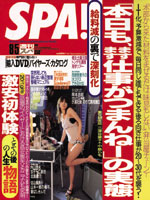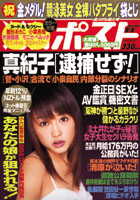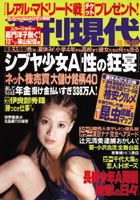Japan's Free Press Faces Punishment
Back to Contents of Issue: September 2003
|
|
|
|
by Leo Lewis |
|
|
Despite months of noisy criticism from lobbying groups and concerned members of the general public, a highly controversial privacy protection bill has now successfully passed into Japanese law. The government, led by Prime Minister Junichiro Koizumi, has presented the legislation as a service to data protection; most journalists have decried it as outright media control and a significant clampdown on press freedom -- particularly on the freedom of what is arguably the most effective sector of the press.
There is plenty of gratuitous titillation The weekly magazines boast of their unique investigative talent and independent status from every kiosk in Japan. The lurid covers of Flash, Spa!, Friday, Shukan Post, Shukan Gendai (pictured here) and others may entice the salaryman reader with pictures of semi-naked girls, but the real action between the covers is very often deadly serious journalism. There is plenty of gratuitous titillation and tabloid exaggeration, but amid the garishness the weekly magazines have shone their torches into Japan's darkest corners, illuminating for the common reader everything from top-level bribery to nuclear cover-ups to food-labeling scams.
The magazines have an impressive history behind them as well. Their recent exposure of a sex scandal involving former Chief Cabinet Secretary Hidenao Nakagawa and a financial impropriety surrounding Farm Minister Tadamori Oshima drove both to humiliating resignations. The scoops were all the more impressive for the fact that Japan's official newspapers, with their hundreds-strong armies of journalists, did not pick up on the stories until they were too big to ignore.
Supposedly aimed at protecting personal information, the progress of the new privacy bill has blown open the gulf between those media groups that clearly form part of the establishment, and those that make their living from exposure of scandal and direct antagonism to it. As the sole constituent of the latter group, the news magazines now bear the full brunt of what has become Japan's first ever privacy law.
"They don't let any of us in to the clubs because they are so keen on information control," says Seigo Kimata, editor of Shukan Bunshun. "So we have to use real journalism skills."
"There has always been a wall," adds Junji Asano, president of the Japan Magazine Publishers' Association (JMPA). "The big difference is that now you can see it. Actually, we can do more damage being outside the wall. Once you're inside it, and part of the system, you can't make people angry anymore."
But that exemption process forced the lawmakers into the complex mire of having to define "media organization." Its decision stunned the country: Japan's weekly and monthly magazines have not been clearly granted the same exemptions granted to daily newspapers and TV stations because they are not, in the government's nervous eyes, "objective reporters of news." If many of the old scoops were now republished, the journalists involved would face heavy fines and a maximum of six months behind bars.
"This is just the settling of a lot of very old scores," says Yotaro Ishida, a freelance reporter who has worked on projects with most of the big weeklies. "The magazines have done so much damage to the establishment by reporting on its scandals, it is natural that the MPs will take the opportunity to punish them."
In his role as president of the JMPA, Asano led the protests against the bill, but found that his cause lacked political support because of the enemies his industry had made. "I see it as a badge of honor," he says now with a broad grin. "They know we are clever and that we will think up a way to continue our work. The problem with Japan is not really laws like this, but what I call uchinaru-kissei -- 'regulations within ourselves.' Japan could have a free press, but large parts of it choose not to be free." @ |
|
Note: The function "email this page" is currently not supported for this page.


 THE JAPANESE RIGHT TO read about murderous religious cults, corrupt city governors and mercury-infested milk is on the ropes. The country's weekly news magazines, regarded by their millions of readers as the last bastion of serious investigative journalism in Japan, have come under intense attack from the central government. The magazines' much-feared capacity to root out criminality and splash scandal across Japanese newsstands will be confined to a legal straightjacket that editors say amounts to state censorship.
THE JAPANESE RIGHT TO read about murderous religious cults, corrupt city governors and mercury-infested milk is on the ropes. The country's weekly news magazines, regarded by their millions of readers as the last bastion of serious investigative journalism in Japan, have come under intense attack from the central government. The magazines' much-feared capacity to root out criminality and splash scandal across Japanese newsstands will be confined to a legal straightjacket that editors say amounts to state censorship.
 A browse through recent offerings turns up Shukan Jitsuwa's investigation of the Taiwanese casino mafia, Friday's revelations of a JPY285 billion public fund fraud, Shukan Gendai's inside track on university "rape clubs" and Shukan Taisho's tracking of the illegal whale meat trade. Many of these stories receive scant attention (if any) in Japan's heavily censorious official media.
A browse through recent offerings turns up Shukan Jitsuwa's investigation of the Taiwanese casino mafia, Friday's revelations of a JPY285 billion public fund fraud, Shukan Gendai's inside track on university "rape clubs" and Shukan Taisho's tracking of the illegal whale meat trade. Many of these stories receive scant attention (if any) in Japan's heavily censorious official media.
 But the law is hardly the first establishment attempt to clip the wings of magazine reporting. Journalists from the weeklies are consistent victims of the kissha-kurabu (reporter club) system -- a much criticized convention that effectively bars certain journalists from official press conferences and background briefings with politicians, police, lawyers and business leaders.
But the law is hardly the first establishment attempt to clip the wings of magazine reporting. Journalists from the weeklies are consistent victims of the kissha-kurabu (reporter club) system -- a much criticized convention that effectively bars certain journalists from official press conferences and background briefings with politicians, police, lawyers and business leaders.
 In the early stages of the bill's development, the government was sensitive to the charge that constraints on personal information amounted to censorship. The first version of the bill collapsed last year because the powerful newspapers -- led by the Yomiuri Shimbun and the Asahi Shimbun, Japan's two best-selling broadsheets -- raised exactly that concern at the stage when the legislation would have applied to them. The proposed law was rewritten to suit the big papers and to exempt "media organizations" and academics.
In the early stages of the bill's development, the government was sensitive to the charge that constraints on personal information amounted to censorship. The first version of the bill collapsed last year because the powerful newspapers -- led by the Yomiuri Shimbun and the Asahi Shimbun, Japan's two best-selling broadsheets -- raised exactly that concern at the stage when the legislation would have applied to them. The proposed law was rewritten to suit the big papers and to exempt "media organizations" and academics.
 That opinion is shared by Asano, also the chairman of Toyo Keizai and a magazine veteran who broke some of Japan's hottest financial scandals. It was largely his work that exposed the holes in Yamaichi Securities and the Long Term Credit Bank before they collapsed. "Newspapers and TV in Japan are seen by the establishment as being part of the establishment," says Asano. "They are relatively safe for politicians and bureaucrats to talk to. Magazines are seen as just antagonistic, so you can understand this law hitting us. It isn't really true democracy."
That opinion is shared by Asano, also the chairman of Toyo Keizai and a magazine veteran who broke some of Japan's hottest financial scandals. It was largely his work that exposed the holes in Yamaichi Securities and the Long Term Credit Bank before they collapsed. "Newspapers and TV in Japan are seen by the establishment as being part of the establishment," says Asano. "They are relatively safe for politicians and bureaucrats to talk to. Magazines are seen as just antagonistic, so you can understand this law hitting us. It isn't really true democracy."



